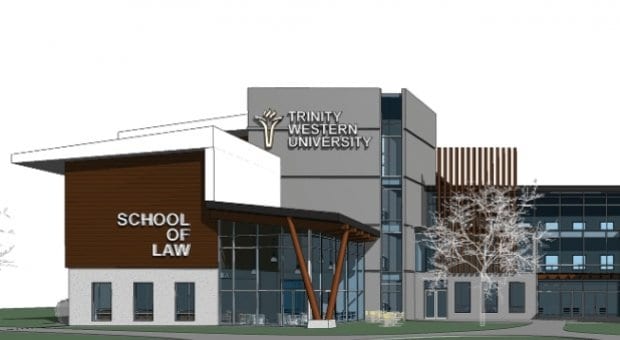Directors of the Law Society of British Columbia seemingly held their noses April 11 as they voted to approve the proposed law school at the Christian Trinity Western University (TWU).
To be admitted to TWU, students must sign a covenant agreeing to uphold Christian biblical teachings, including no premarital sex and no homosexuality. Failure to uphold these commitments, according to the student handbook, could result in discipline, dismissal or a refusal to readmit a student to the university.
It was that covenant to which directors came back repeatedly in their comments, describing it as discriminatory, repugnant and a throwback to earlier times and comparing it to racial segregation.
But, when they came to vote 20 to six in favour of recognizing the school as capable of producing graduates fit to practise law in BC, most agreed they had to follow the law as it exists and allow the school.
In 2001, the Supreme Court of Canada upheld TWU’s right to teach Christian values to would-be teachers and to insist that incoming students sign its covenant. The court found that graduates of TWU’s teacher-education program are entitled to hold “sexist, racist or homophobic beliefs” as long as they don’t act on them in the public school classrooms to which they might be assigned.
“Until the Supreme Court determines otherwise, we as benchers [as the directors are known] are bound to comply with the rule of law,” director Tony Wilson said. “The Trinity Western teachers’ case is still the law.”
Wilson nonetheless said enforced sexuality is “risky public policy.”
Director Miriam Kresivo said religion can breed intolerance, but religious and equality rights must be balanced.
“I do not think we can bar TWU from a law school even though the covenant may be abhorrent to me,” she said.
Elizabeth Rowbotham added that it would be discriminatory to bar students from practising law based on where they went to school.
TWU president Bob Kuhn is pleased with the outcome. “We all need the security of the rule of law,” he tells Xtra. “Otherwise, what particular social moray is in vogue at the time will dictate.”
This is an important decision for all Canadians, he says. “It says that there is room in a democratic country like Canada for a law school at a Christian university.”
The debate before the vote was spirited and respectful.
Director Joe Arvay called the covenant “a metaphorical sign at the gate which says no LGBT students, faculty or staff are welcome.”
He asked what the law society would do if the covenant dealt with interracial marriage.
He was incensed by his fellow directors’ assertions that they had to follow the 2001 ruling. “I don’t recognize that law,” he said. “We are the law. We are the law-making body.”
“The law is never frozen in time,” he added. “It is always evolving.”
Director Cameron Ward agreed. “A case decided by the Supreme Court 13 years ago may well be decided differently today,” he said. “We’re elected to be leaders, not followers.”
Director Jamie Maclaren said the prerequisite to being a judge is being a lawyer, saying TWU puts the LGBT community at a disadvantage to walk that path. He asked if the discussion would be happening if the issue were around women, disabled people or other races.
“Is sexual orientation a somehow more equitable basis for discrimination?” he asked. “The law society must take every opportunity to condemn discrimination against marginalized people.” He and the other dissenters were in the minority, however, as directors discussed balancing the Charter of Rights and Freedoms provisions on freedom of religion and equality.
“Societal values and the Charter must not be conflated,” Lynal Doerksen said. “Just because someone is out of step with social values does not mean the Charter should be used as a step to force them into line.”
As debate wound down, directors addressed themselves to TWU representatives. David Mossop said that just because TWU has the covenant doesn’t mean it should use it.
“To be a successful law school in Canada, you have to have broad support in the legal community,” Mossop said. “You do not have that.”
Others said they hoped the law students themselves would address the covenant and work to change it. Others encouraged the school to revisit the covenant.
Some noted that if TWU graduates act inappropriately as lawyers, they can be disciplined by the law society.
Director Pinder Cheema said TWU graduates will be identified and the covenant will follow them into the profession.
Advanced Education Minister Amrik Virk approved TWU’s law school application Dec 18, saying the province’s Degree Quality Assessment Board had reviewed the proposed law degree and found it met the quality assessment criteria for private and out-of-province public institutions.
The school was earlier given the green light by the Federation of Law Societies of Canada, though several provincial law societies are still debating whether to admit TWU law graduates to their associations.
Ontario’s law society will meet again on April 24, and New Brunswick will meet on June 27.
Alberta and Saskatchewan have stated they will go along with the federation’s decision.

 Why you can trust Xtra
Why you can trust Xtra


